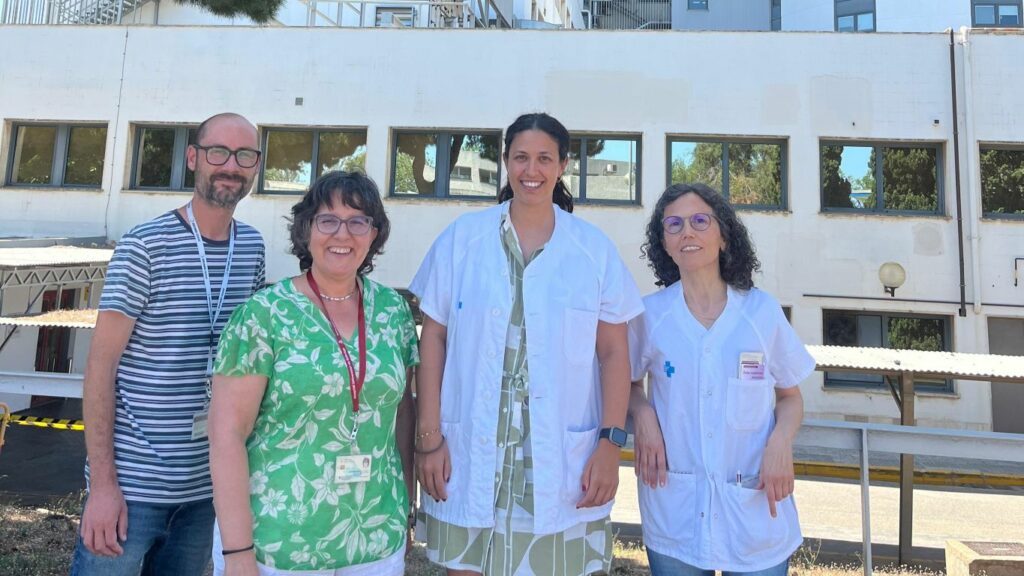A team of researchers from the Bellvitge Biomedical Research Institute (IDIBELL), the Bellvitge University Hospital and the CIBER of Respiratory Diseases (CIBERES) has published a new study that analyzes the evolution of amoxicillin resistance in cases of invasive pneumococcal pneumonia. The results, published in the journal Antimicrobial Agents and Chemotherapy, show that this resistance persists despite the introduction of conjugate vaccines and can have negative consequences in people at higher risk.
The study reviewed 1,592 episodes of invasive pneumococcal pneumonia and analysed both their sensitivity to antibiotics and the genetic characteristics of the bacterial strains, as well as the clinical course of the affected people. According to the results, amoxicillin may be associated with a less favourable clinical outcome, especially in cases with resistant strains and in people with a worse initial prognosis.
“This resistance not only persists, but is concentrated in a highly adapted clone that, until now, has managed to escape the effect of vaccines and shows resistance to several β-lactam antibiotics,” explains Dr. Jordi Càmara, principal investigator of the Epidemiology of Bacterial Infections group at IDIBELL-HUB and first author of the study.
Invasive pneumococcal pneumonia: a serious infection
Streptococcus pneumoniae is one of the leading causes of respiratory infections in adulthood. It is an opportunistic pathogen that is part of the natural bacterial flora of the respiratory tract and is sometimes responsible for a wide variety of clinical and infectious conditions. Some of them are serious, such as invasive pneumococcal pneumonia, which occurs when the bacteria enters and colonizes the bloodstream. This form can have a mortality rate of more than 20% in people with risk factors.
Thus, despite the positive impact and success of childhood vaccination in the prevention of pneumococcal diseases such as this one in children, the persistence of resistant strains makes it necessary to reinforce vaccination programs aimed also at the adult population with risk conditions.
Bacteria adaptation: resistant strains that escape vaccines
This need to reinforce vaccination and maintain continuous epidemiological surveillance is more than evident and corroborated, once again, by the results of the study published in Antimicrobial Agents and Chemotherapy. In this, the researchers have identified the GPSC6/PMEN3 clone of Streptococcus pneumoniae as the main culprit of the resistances that have been detected.
This strain has evolved genetically to resist both the action of conjugate vaccines and the effect of various antibiotics, such as amoxicillin. This highlights the bacterium’s ability to adapt and reinforces the importance of maintaining constant surveillance, characterizing the different strains, monitoring resistance, and updating vaccines for the adult population. This is the best way to be alert to the adaptive evolution of this pathogen.
Treatments adapted to each person
However, despite these results, the study points out that amoxicillin may continue to be useful in specific contexts, such as in the de-escalation of antibiotics in optimisation programmes (PROA) or as an empirical treatment in stabilised people with a good prognosis.
Thus, it should be stressed that the emergence of resistance by some strains does not rule out the use of amoxicillin and other antibiotics for the treatment of pneumonia, but simply requires considering the clinical context of each case to determine the best therapeutic strategy. As Dr. Cámara points out, “It is essential to individualize the treatment of pneumonia taking into account the clinical situation and risk factors of each person.”
International scientific recognition
The article has been selected as Editor’s Pick by the journal Antimicrobial Agents and Chemotherapy, a recognition that highlights its interest to the scientific community. The work is part of the line of research on pneumonia promoted jointly by the Microbiology and Infectious Diseases services of the Bellvitge University Hospital for more than forty years.
The Bellvitge Biomedical Research Institute (IDIBELL) is a research centre created in 2004 and specialising in cancer, neuroscience, translational medicine and regenerative medicine. It has a team of more than 1,500 professionals who, from 73 research groups, publish more than 1,400 scientific articles a year. L’IDIBELL is participated by the Bellvitge University Hospital and the Viladecans Hospital of the Catalan Health Institute, the Catalan Institute of Oncology, the University of Barcelona and the City Council of L’Hospitalet de Llobregat.
IDIBELL is a member of the Campus d’Excelencia Internacional of the University of Barcelona HUBc and is part of the CERCA institution of the Generalitat de Catalunya. In 2009 it became one of the first five Spanish research centres accredited as a health research institute by the Carlos III Health Institute. In addition, it is part of the HR Excellence in Research program of the European Union and is a member of EATRIS and REGIC. Since 2018, IDIBELL has been an Accredited Centre of the AECC Scientific Foundation (FCAECC).

